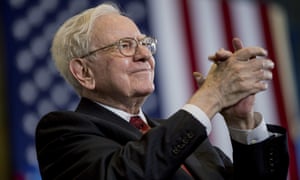Warren Buffett, 'Oracle of Omaha', criticises Wall Street and praises immigrants
- Billionaire releases annual letter to Berkshire Hathaway shareholders
- Praise of ‘talented and ambitious immigrants’ sits at odds with Trump

Warren Buffett applauds at a rally for Democratic presidential candidate Hillary Clinton in Omaha, Nebraska. Photograph: Andrew Harnik/AP
Shares
67
Comments
57
Reuters in New York
Saturday 25 February 2017 12.03 ESTFirst published on Saturday 25 February 2017 09.29 EST
The
billionaire Warren Buffett, whose stock picks have turned Berkshire Hathaway into one of the most successful conglomerates in the world, criticised Wall Street on Saturday, saying investors should “stick with low-cost index funds”.
The much-scrutinised annual letter to shareholders from the man many investors call “the Oracle of Omaha” also revealed that Berkshire Hathaway’s gain on its
investment in Apple stands at more than $1.6bn, after shares of
the iPhone makersurged.
Unlike last year, Buffett, a vocal supporter of Hillary Clinton,
did not mention President Donald Trump by name. He did, however, talk up the vibrancy of American society and its inclusion of immigrants, one of the most polarizing issues under the Trump administration.
“One word sums up our country’s achievements: miraculous,” Buffett said. “From a standing start 240 years ago – a span of time less than triple my days on earth – Americans have combined human ingenuity, a market system, a tide of talented and ambitious immigrants, and the rule of law to deliver abundance beyond any dreams of our forefathers.”
In 2016, Buffett wrote that Trump was “dead wrong” to talk down America’s economic future and also emphasised the threat of climate change, which Trump has questioned.
This year, regarding Wall Street, Buffett wrote: “When trillions of dollars are managed by Wall Streeters charging high fees, it will usually be the managers who reap outsized profits, not the clients. Both large and small investors should stick with low-cost index funds.”
Buffett estimated that the search for outperformance has caused investors to “waste” more than $100bn over the past decade.
He called Vanguard Group founder Jack Bogle “a hero” for his early efforts to popularize index funds.
Berkshire Hathaway gained 20.8% per year from 1965 to 2016, compared to the S&P 500’s 9.7% gain, the company said. In 2014, Buffett said he planned to put 90% of the money he leaves his wife when he dies into an S&P 500 index fund and 10% in government bonds.
During the financial crisis, Buffett bet a founder of the asset management company Protege Partners $1m that a Vanguard S&P 500 stock index fund would outperform several groups of hedge funds of over the 10 years through 2017.
The index fund is up 85.4%, Buffett said in his 2016 annual letter, while the hedge fund groups are up between 2.9% and 62.8%.
Buffett said the figures left “no doubt” that he would win the bet. He plans to donate the money to
Girls Incorporated of Omaha, a charity.
Buffett’s Apple stake of 61.2 million shares was
acquired last year for $6.75bn, an average of about $110.17 apiece, according to the annual letter. The holding was valued at more than $8.3bn as of Friday’s $136.66 closing price.
Berkshire became one of the top 10
Apple investors, taking a stake of more than 9 million shares in the first quarter of 2016 and then accelerating purchases in the last three months of the year.
“I think Buffett likes Apple because of the hold or control that they are gaining over the lives of above-average income Americans and people around the world,” said Bill Smead of Smead Capital Management.
“Buffett knows that people have become addicted to Apple products and he invests in these addictions.”
The Apple investment appears to reflect much of the $12bn of stock that Buffett said he had bought between the 8 November presidential election and the end of January.
Mr. Tenev said the company was looking to solve these problems.




